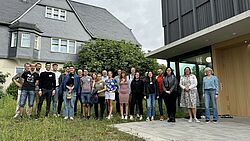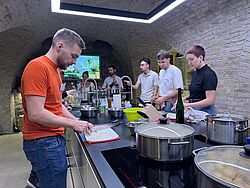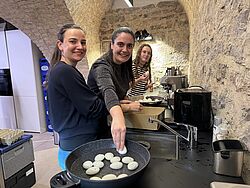The summer school, which ran under the title ‘(Navigating) Food Horizons’, was offered as an ERASMUS+ Blended Intensive Program and was hosted together with partners from the Universidad de La Rioja in Spain, University of Agricultural Sciences and Veterinary Medicine Cluj-Napoca in Romania, and Eszterházy Károly Catholic University in Hungary.
After an initial virtual seminar, 19 students and colleagues from the different partner universities met in person for a weeklong stay in Geisenheim. The summer school program included several technical presentations by lecturers from the participating countries as well as practical sessions. Students had the chance to directly apply their theoretical knowledge by producing pasta, plant oils, and alcohol-free beer. On their first evening in Geisenheim, the students were also able to try their hand at making Frankfurter Grüne Soße – a protected Hessian dish – at a get-together in the Unikeller event space at Hochschule Geisenheim University.
On Thursday, participants in the summer school headed out on an excursion into the greater Rhine-Main region and had the chance to look behind the scenes at Lufthansa Cargo and FrischeParadies in Frankfurt.
The summer school was met with a very positive response from all participants; beyond the academic aspects of the event, there was also plenty of opportunity for intercultural exchange and gaining international experience.

























